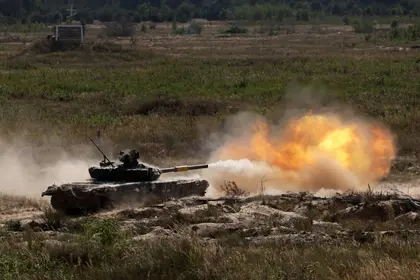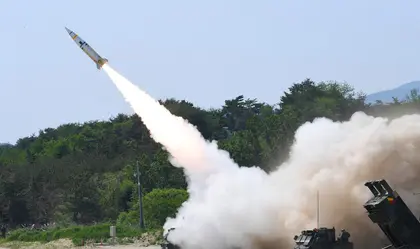The Sumy region, bordering Russia in Ukraine’s Northeast, is being actively targeted by saboteur-reconnaissance groups to tie up Kyiv’s reserve forces so they can’t be used in the counteroffensive further south, officials have said.
Ukraine’s State Border Service spokesperson, Andriy Demchenko, said that these Russian sabotage-reconnaissance groups (DRG) persist in their attempts to breach the border in the Sumy region.
JOIN US ON TELEGRAM
Follow our coverage of the war on the @Kyivpost_official.
“The enemy has been actively using DRG in the Sumy direction recently,” Demchenko said during a telethon on Thursday, Nov. 16.
However, the sabotage-reconnaissance groups in the Kharkiv and Chernihiv regions are less active.
“Recently, it’s the Sumy region that is ‘attractive’ for the enemy to use saboteurs,” Demchenko said.
The Sumy region shares borders with Russia’s Bryansk, Kursk, and Belgorod regions in the north and east.
Colonel Vladyslav Seleznyov, former head of the Ukrainian Armed Forces (AFU) General Staff press service, told Kyiv Post that special forces units from the Kursk region of Russia, conducting search, raid, and sabotage actions, contribute to the current activation in the Sumy region.
“The fact that activation has now started in the Sumy region is because the enemy has resources, and it is important for him, having the appropriate set of resources, to scatter our resources as much as possible so that we do not have the opportunity to use them,” Seleznyov said.

Inside the South Korean Weapons Factory That Could Supply Kyiv
He said that the Russians are attempting to compel the Ukrainian General Staff to maintain a substantial defense force presence in the Sumy region, diverting resources from the more pressing direction now – the Kupyansk district in the Kharkiv region.
Seleznyov said that the enemy’s attempts to infiltrate sabotage-reconnaissance groups and cause mortar and artillery damage along the border occur throughout the Chernihiv, Sumy, and Kharkiv regions.
“Frankly speaking, enemy DRGs try to enter the Kyiv region from time to time,” Seleznyov said.
According to him, a group comprising over 26,000 soldiers is assembled in the Kursk, Bryansk, and Belgorod regions of Russia.
“Although their official mission is stated as strengthening the state border between Russia and Ukraine, in reality, they are creating significant challenges for our border regions, compelling us to maintain substantial forces there,” Seleznyov said.
The military expert predicts that Russia will continue its active actions to keep Ukrainian forces under tension in non-combat zones, hindering the transfer of reserves to critical frontlines such as the “Lyman direction, Avdiivka, or Bakhmut region.”
Demchenko said that the State Border Service, equipped with anti-sabotage reserves, observation posts, and fortifications, is effectively countering the Russian saboteurs.
He said the Border Service guards employ drones to monitor the border, ensuring timely detection of Russian DRGs.
“As soon as our defenders and border guards identify the DRG, they immediately open fire, forcing them beyond the borderline,” said Demchenko.
Kyiv Post also sought a comment from the State Border Guard Service, but as of the time of publication, it had not responded.
You can also highlight the text and press Ctrl + Enter






